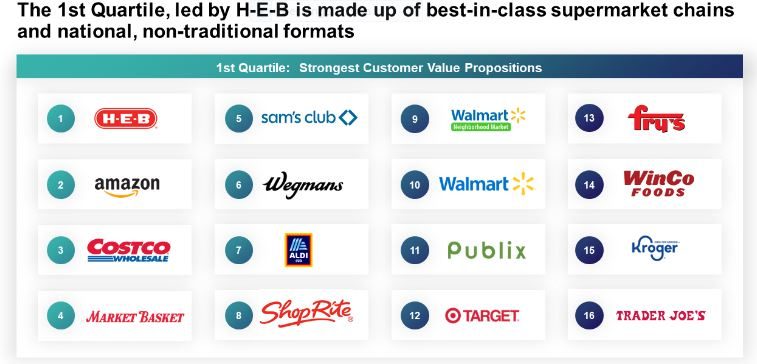
The fascination in the produce industry with rankings of grocery retailers resembles that of the general population with the Oscars.
The market analyst dunnhumby has produced its annual list of the top fifteen retail grocers in terms of “the strongest customer value propositions,” as determined by its Retailer Preference Index
They are:
- HEB
- Amazon
- Costco
- Market Basket
- Sam’s Club
- Wegmans
- Aldi
- ShopRite
- Walmart Neighborhood Market
- Walmart
As with the Oscars, there are some surprises. Marketing Daily comments: “Amazon has held a Top Three position in every index: interesting given the company’s well-publicized stumbles in grocery. But the many things Amazon gets right really matter to shoppers.”
Of course, Amazon and Amazon Fresh came in at numbers 1 and 2 in the digital category.
In terms of “strong emotional connection,” H-E-B and Costco ranked the highest (72 and 67 percent) respectively. Perhaps not coincidentally, these two chains also have reputations for treating their employees well. Only 47 percent felt a strong emotional connection with Walmart.
Amazon ranked third in strong emotional connections, at 64 percent of customers; Amazon Fresh was number 7, at 58 percent. I would have thought Amazon would have done better in the “speed and convenience” category, but it came in only at number 6, with Fareway, Publix, and Aldi at the top.
The Amazon scores must be evaluated alongside the company’s recent decision to close its second and last drive-up operation: Amazon Fresh Pickup, in a Seattle location, suggesting that the online giant is still struggling to cope with the world of brick and mortar.
Another finding: “With the exception of H-E-B, WinCo, Market Basket, and ShopRite, regional supermarkets—even those under the umbrella of Kroger, Albertsons-Safeway or Ahold—are looking up at these 15. Most of the 15 are national chains, non-traditional formats that together earn more grocery dollars than supermarkets.”
I am sure that advocates of the Kroger-Albertsons merger will take up this information as yet more evidence that they are valiant little guys who are struggling against merciless titans like Amazon, Walmart, and Costco.
The fascination in the produce industry with rankings of grocery retailers resembles that of the general population with the Oscars.
The market analyst dunnhumby has produced its annual list of the top fifteen retail grocers in terms of “the strongest customer value propositions,” as determined by its Retailer Preference Index
They are:
- HEB
- Amazon
- Costco
- Market Basket
- Sam’s Club
- Wegmans
- Aldi
- ShopRite
- Walmart Neighborhood Market
- Walmart
As with the Oscars, there are some surprises. Marketing Daily comments: “Amazon has held a Top Three position in every index: interesting given the company’s well-publicized stumbles in grocery. But the many things Amazon gets right really matter to shoppers.”
Of course, Amazon and Amazon Fresh came in at numbers 1 and 2 in the digital category.
In terms of “strong emotional connection,” H-E-B and Costco ranked the highest (72 and 67 percent) respectively. Perhaps not coincidentally, these two chains also have reputations for treating their employees well. Only 47 percent felt a strong emotional connection with Walmart.
Amazon ranked third in strong emotional connections, at 64 percent of customers; Amazon Fresh was number 7, at 58 percent. I would have thought Amazon would have done better in the “speed and convenience” category, but it came in only at number 6, with Fareway, Publix, and Aldi at the top.
The Amazon scores must be evaluated alongside the company’s recent decision to close its second and last drive-up operation: Amazon Fresh Pickup, in a Seattle location, suggesting that the online giant is still struggling to cope with the world of brick and mortar.
Another finding: “With the exception of H-E-B, WinCo, Market Basket, and ShopRite, regional supermarkets—even those under the umbrella of Kroger, Albertsons-Safeway or Ahold—are looking up at these 15. Most of the 15 are national chains, non-traditional formats that together earn more grocery dollars than supermarkets.”
I am sure that advocates of the Kroger-Albertsons merger will take up this information as yet more evidence that they are valiant little guys who are struggling against merciless titans like Amazon, Walmart, and Costco.
Richard Smoley, contributing editor for Blue Book Services, Inc., has more than 40 years of experience in magazine writing and editing, and is the former managing editor of California Farmer magazine. A graduate of Harvard and Oxford universities, he has published 12 books.




